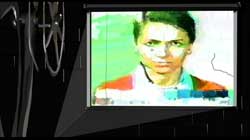(There's a chimp sitting next to a projector. The words "NOISE AND SILENCE" are written onto the screen and the chimp begins lecturing. Voice of Steve Fitch.)
 Our critique began as all critiques begin: with doubt. Doubt became our narrative. Ours was a quest for a new story, our own. And we grasped toward this new history driven by the suspicion that ordinary language couldn't tell it. Our past appeared frozen in the distance, and our every gesture and accent signified the negation of the old world and the reach for a new one. The way we lived created a new situation, one of exuberance and friendship, that of a subversive microsociety, in the heart of a society which ignored it. Art was not the goal but the occasion and the method for locating our specific rhythm and buried possibilities of our time. The discovery of a true communication was what it was about, or at least the quest for such a communication. The adventure of finding it and losing it. We the unappeased, the unaccepting continued looking, filling in the silences with our own wishes, fears and fantasies. Driven forward by the fact that no matter how empty the world seemed, no matter how degraded and used up the world appeared to us, we knew that anything was still possible. And, given the right circumstances, a new world was just as likely as an old one.
Our critique began as all critiques begin: with doubt. Doubt became our narrative. Ours was a quest for a new story, our own. And we grasped toward this new history driven by the suspicion that ordinary language couldn't tell it. Our past appeared frozen in the distance, and our every gesture and accent signified the negation of the old world and the reach for a new one. The way we lived created a new situation, one of exuberance and friendship, that of a subversive microsociety, in the heart of a society which ignored it. Art was not the goal but the occasion and the method for locating our specific rhythm and buried possibilities of our time. The discovery of a true communication was what it was about, or at least the quest for such a communication. The adventure of finding it and losing it. We the unappeased, the unaccepting continued looking, filling in the silences with our own wishes, fears and fantasies. Driven forward by the fact that no matter how empty the world seemed, no matter how degraded and used up the world appeared to us, we knew that anything was still possible. And, given the right circumstances, a new world was just as likely as an old one.
(The lecturing chimp eats his notes and "TO BEGIN AGAIN ... FROM THE BEGINNING" is placed on the screen. A young male's face is flashed on the screen, and the projector runs out of film.)
***
(Main character sitting with a man in a bar/restaurant. University of Texas at Austin philosophy professor Louis Mackey.)
There are two kinds of sufferers in this world: those who suffer from a lack of life and those who suffer from an overabundance of life. I've always found myself in the second category. When you come to think of it, almost all human behavior and activity is not essentially any different from animal behavior. The most advanced technologies and craftsmanship bring us, at best, up to the super-chimpanzee level. Actually, the gap between, say, Plato or Nietzsche and the average human is greater than the gap between that chimpanzee and the average human. The realm of the real spirit, the true artist, the saint, the philosopher, is rarely achieved.
Why so few? Why is world history and evolution not stories of progress but rather this endless and futile addition of zeroes. No greater values have developed. Hell, the Greeks 3,000 years ago were just as advanced as we are. So what are these barriers that keep people from reaching anywhere near their real potential? The answer to that can be found in another question, and that's this: Which is the most universal human characteristic - fear or laziness?
***